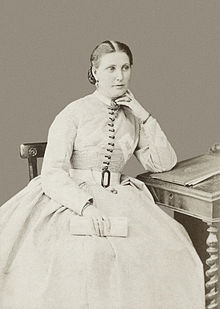Florence Baker
Florence Barbara Maria, Lady Baker (born August 6, 1841 in Strasbourg am Mieresch ( Transylvania ), Austrian Empire , † March 11, 1916 in Newton Abbot ( Devon ), England ) was the second wife of Sir Samuel White Baker and accompanied them his research trips to Africa . Together they were the first Europeans to explore Lake Albert and large parts of the upper reaches of the White Nile. She was the first and, in the 19th century, the only European woman to take part in expeditions to the sources of the Nile.
resume
In 1841 (according to other, less well-confirmed sources, 1845) she was born under the Hungarian name Barbara Maria Szász (German: Maria Freiin von Sass; ro .: Florica Maria Sas) in Strasbourg am Mieresch (today: Aiud ) in the Austrian Empire Transylvania was born as the daughter of a German-born aristocratic family. Her father was Mathias (von) Szász (Sass), adjutant of the Polish general Józef Bem under Lajos Kossuth during the Hungarian Revolution of 1848/1849 in Transylvania.
According to later accounts, her parents were murdered on the family seat in Transylvania during the revolution. She then grew up in an Ottoman harem . In 1859 she was to be sold as a slave on the slave market in Vidin (in today's Bulgaria ). It was there that Samuel White Baker, who happened to be present, became aware of her.
The future Baker couple always presented the further story in such a way that Samuel Florence had wanted to buy his ransom, but had been outbid by the Ottoman Pasha von Widin. Then Samuel freed them after bribing the slave guards. Both fled hidden in a carriage to Bucharest , where Baker was tasked with planning and building a railway line through the Dobruja as a supervisor . At Baker's request, the British consul issued her with a British passport in the name of Florence Barbara Maria Finnian . While there are independent sources for the origin and the presence of the two on the slave market, only the statements of the Bakers are available for liberation and common escape, which were also a frequent motif of romantic adventure novels at the time, so that the truth content is questionable.
Florence first became Samuel's companion, then his partner and in 1865 his wife.
Travel to Africa
In 1861 she and her future husband set off on an expedition to explore the sources of the Nile . They discovered and explored Lake Albert , were the first Europeans to come to the Murchison Falls and traveled to previously unknown areas on the upper reaches of the Nile.
In 1869 she took part at the side of her husband in another expedition on behalf of the Khedive and stayed with him until 1873 in Sudan , where the latter had taken over the function of governor of Equatoria .
Living in the UK
Because of Baker's in the dark ancestry and the fact that she had lived with her future husband unmarried for over six years, Queen Victoria refused to see her. While her husband was being honored, she was excluded from official invitations. After the death of her husband, she withdrew completely into private life.
Others
The life and love affair of the Baker couple, which was extraordinarily unusual for the Victorian era, gave rise to numerous speculations and reports in the contemporary press. Both of them gladly accepted this, as it increased their popularity and increased the circulation of the numerous books written by Samuel White Baker.
Although Florence Baker was instrumentalized by the suffragettes as an example of the productivity of women, she herself had neither desired nor encouraged this.
death
Florence Baker died on March 11, 1916 at the age of 74 in her Newton Abbot home . She outlived her husband by 22 years and was buried next to him.
literature
- Florence Baker, Anne Baker: Morning star. Florence Baker's diary of the expedition to put down the slave trade on the Nile 1870-73. William Kimber, London 1972.
- Pat Shipman: With the heart of a lioness. Malik, 2005, ISBN 3-89029-247-X .
Web links
- Florence Baker at the National Portrait Gallery
Individual evidence
- ↑ Éva Wajda: Florence Baker, a Nearly Forgotten Hungarian Explorer. In: Magyar News Online , issue 130 (March 2019, PDF )
| personal data | |
|---|---|
| SURNAME | Baker, Florence |
| ALTERNATIVE NAMES | Szász, Barbara; Finnian, Florence Barbara Maria |
| BRIEF DESCRIPTION | English African explorer |
| BIRTH DATE | August 6, 1841 |
| PLACE OF BIRTH | Aiud ( Transylvania ), Austria-Hungary |
| DATE OF DEATH | March 11, 1916 |
| PLACE OF DEATH | Devon , England |

